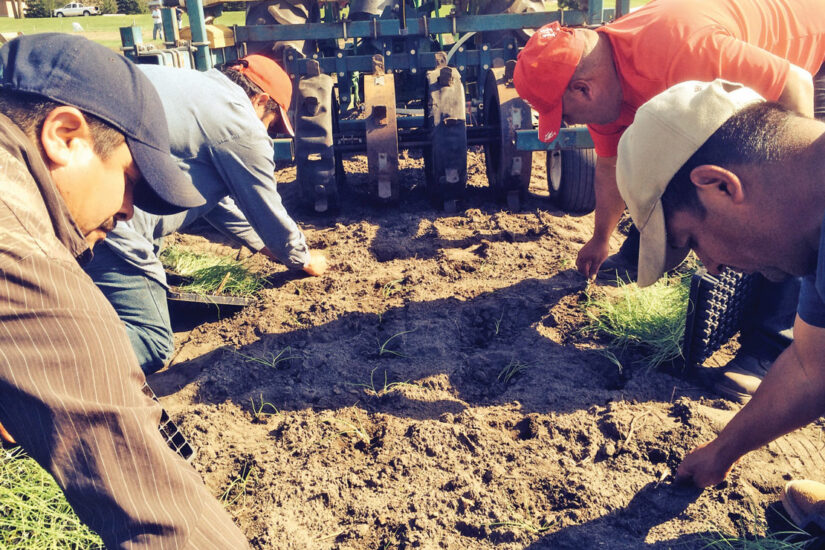
Planting Seeds for the Future
The Initiative Foundation and the Northwest Area Foundation join financial forces to invest more intentionally in Central Minnesota’s underserved communities.
By Gene Rebeck
A couple of years back, Jaime Villalaz got a call from a group of Latino farmers near Long Prairie looking for $150,000 to buy 54 acres of land.
The farmers knew they had an attentive ear. Villalaz is the agricultural business development program director for the Latino Economic Development Center (LEDC), a Minneapolis-based nonprofit that supports Latino entrepreneurs in the metro area and Central Minnesota. What’s more, he had been working with this group, the Agua Gorda Cooperative, since 2012. Villalaz took their case to LEDC loan program director Rocio Bustillos and agency founder Ramón León, who in turn approached the Initiative Foundation.
It was the type of funding the Foundation was happy to provide. And now the Foundation is in an even better position to help more businesses succeed.
In January, the Initiative Foundation received a $1 million investment from the St. Paul-based Northwest Area Foundation. The Initiative Foundation will use this program-related investment to increase the number and amount of loans it makes—with an emphasis on quality jobs for economically disadvantaged people.
Filling a Gap
The relationship between the two foundations began in 2006 when the Northwest Area Foundation made a 10-year, $1 million investment in the Initiative Foundation’s revolving loan fund. The investment targeted the Foundation’s Green Loan program and projects that involved alternative energy, energy efficiency and recycling, said Lynn Bushinger, the Initiative Foundation’s chief operating and financial officer.
This new investment will have a different mission.
“We’re looking to increase the loans we make to new businesses and social enterprise ventures that are creating quality jobs for underserved populations—people living in poverty, women, veterans and new Americans,” Bushinger said. “We have a number of programs that help develop emerging leaders, entrepreneurs and social enterprise efforts. We believe this programming, along with technical assistance, will surface the kind of projects we would like to fund.”
Each year, the Initiative Foundation issues $2.5 to $3 million in loans spread across 24 to 30 transactions. Generally, those dollars are leveraged five or six times. Total project financing per year, therefore, is in the $15 million range. Future Initiative Foundation loans are then financed with the money that’s repaid by the original borrowers.
“Typically, we operate our revolving loan fund as a gap financing product,” said Dan Bullert, the Initiative Foundation’s business finance manager. “We work with other financing sources, typically banks or credit unions that are the lead lenders on projects.” For example, a business might be purchasing equipment or real estate or buying other types of physical assets.
“Oftentimes, a primary lender has limitations on how much they can lend based on regulations and bank policy,” Bullert added. It’s common that a primary lender’s financing rate is limited to 75 or 80 percent of the project cost. “If the borrower doesn’t have the other 20 or 25 percent cash on hand to make it work, the borrower’s plans might be delayed. So we enter the transaction to provide gap financing in conjunction with the primary financing to move the project forward.”
The $1 million investment from the Northwest Area Foundation is a crucial part of the Initiative Foundation’s 2017-2019 strategic priorities. “We will be intentional about supporting and growing for profit and nonprofit businesses; cultivating the next generation of leaders; working with new entrepreneurs as they start businesses and social enterprises; and improving the economic status of disadvantaged people,” Bushinger said.
That means casting a wider net and possibly departing from traditional lending patterns. “We always want to maintain a strong partnership with the financial institutions,” Bullert said. “But if a project comes to us and isn’t necessarily bankable, we want to be able to consider those as well.”
Bushinger said the Northwest Area Foundation’s mission is in direct alignment with the Initiative Foundation’s key strategies.
“Access to capital is key to asset-building in our region,” said Nikki Foster, program officer for the Northwest Area Foundation. “Our program-related investments are meant to directly benefit those low-income communities through lending capital.” The Northwest Area Foundation is dedicated to helping Community Development Financial Institutions (CDFIs) like the Initiative Foundation promote quality jobs and access to capital. “We also are looking for opportunities in our target communities—immigrants and refugees, rural areas, communities of color, and native communities. The Initiative Foundation, which targets resources to rural areas and is starting to work more with immigrants and refugees, particularly in St. Cloud, really aligns with our approach.”
Foster also noted that the Initiative Foundation’s “strong performance on the first program-related investment” was a key reason why the Northwest Area Foundation chose to renew its relationship. “We really rely on the experts in our region like the Initiative Foundation to meet our mission,” she said. “We’re excited to see the positive outcomes of our investment over the next seven years.”
Bearing Fruit
The Initiative Foundation hopes future results resemble those being achieved by the Agua Gorda farmers. Villalaz reported that in late January, the cooperative signed a $20,000 contract with La Loma, a Minneapolis-based tamale manufacturer in Minneapolis. The farmers will supply La Loma with tomatillos that are used for making green salsa.
While deals like this help provide some financial security for the farmers going forward, “the most important thing is, they own their own land,” Villalaz said. The farmers also are able to hire people and “spread some of their revenue in the Latino community.”
With its refreshed lending resources, the Initiative Foundation is poised to help all kinds of communities plant new economic futures.